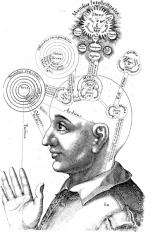October 23, 2009 weblog
Sensory deprivation can produce hallucinations in only 15 minutes

(PhysOrg.com) -- A new study has found that even a short period of sensory deprivation is enough to produce hallucinations even in people who are not normally prone to them.
The 19 volunteers in the study were chosen from over 200 applicants who all completed a Revised Hallucinations Scale questionnaire, which is designed to determine if people are predisposed to hallucinations. The researchers selected nine subjects from applicants who scored in the upper 20th percentile and 10 from the lower 20th.
The researchers, from the University College, London, placed the volunteers one at a time into an anechoic chamber. The chamber had thick outer walls, inner walls of metallic acoustic panels, and a layer of fiberglass sandwiched between them, and completely dampened sound to below the threshold of hearing, and also blocked out all light.
The subject sat in a padded chair in the sensory deprivation room for 15 minutes, during which time many of the subjects reported hallucinations, a depressed mood or paranoia. The volunteers could have used the panic button to be immediately released from the chamber, but none did. After the experiment they completed a Psychotomimetic States Inventory test to determine if they had experienced hallucinations or other experiences resembling psychoses. The test was developed originally to study the experiences of users of recreational drugs.
Of the nine volunteers who had high scores on the first questionnaire, almost all reported experiencing something "very special or important" while inside the chamber. Six saw objects that were not there, five had hallucinations of faces, four reported a heightened sense of smell, and two felt there was an evil presence in the chamber with them.
The 10 volunteers who had lower scores on the questionnaire, indicating they were less prone to hallucinations, still reported experiencing hallucinations and delusions, but to a lesser degree than the other group.
One of the researchers, psychologist Oliver Mason, said the results of the experiment support the idea that hallucinations are produced through what the scientists call faulty source monitoring: the brain misidentifies the source of its own thoughts as arising from outside the body. Mason was not surprised by the rather dramatic results after such a short time, saying the psychosis-inducing effect of sensory deprivation is analogous to the effect of drugs such as cannabis and ketamine, especially in those prone to psychoses. The findings may be important because they suggest that mental illness and normality occur on a continuum.
Future research planned includes studying the effects of sensory deprivation on recreational drug users and people with schizophrenia.
The results of the study are published in the October edition of the Journal of Nervous and Mental Disease.
More information: Journal of Nervous and Mental Disease, The psychotomimetic effects of short-term sensory deprivation, Mason OJ, Brady F.; 197(10):783-5
via Wired
© 2009 PhysOrg.com















